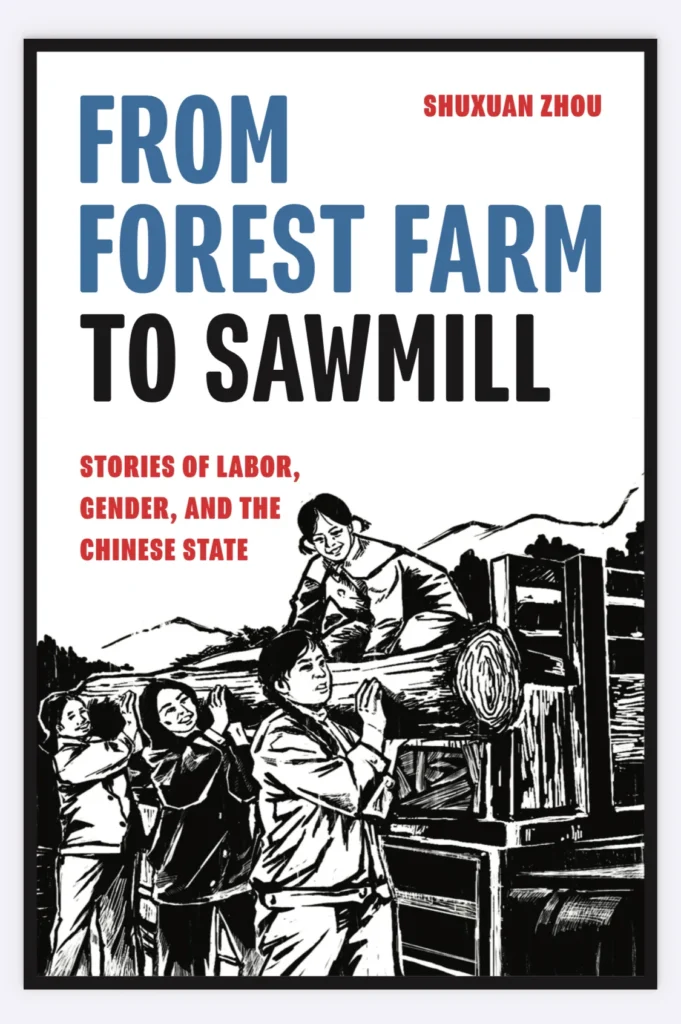Publications
Book
From Forest Farm to Sawmill
Stories of Labor, Gender, and the Chinese State is a worker-centered, woman-centered history of China’s economic transformation.
Socialist China’s state forestry and timber industries employed men as state workers and women as family dependents and collective workers who, beginning in the 1950s, turned rural land into urban-industrial space. These features make forestry a unique case with which to investigate how state policies constructed and reinforced intertwined and co-constitutive dualisms between humanity and nature, urban and rural places, production and reproduction, and male and female labor. Centering on oral histories in Fujian, Shuxuan Zhou situates firsthand accounts of labor and resistance in forestry and wood processing within the larger context of postrevolutionary socialist reforms through China’s rapid economic development after the 1990s. Zhou shows how, in response to state development projects that exploited female labor, immigrants, rurality, and forests, workers created a space for their personal and political demands. In considering how sawmill and forest farmworkers creatively reconfigured state projects and challenged authority, this book opens a conversation among the fields of gender studies, labor studies, and environmental studies.

Praise for From Forest Farm to Sawmill
Essays
“The Posthumous Child.” Sixth Tone, August 8 2022
In this deeply personal and political essay, Shuxuan delves into her family’s past. It won the grand prize in the creative nonfiction contest hosted by Sixth Tone, an online magazine focused on content connected to contemporary China.
“The Real Lives of America’s Chinese Masseuses.” Sixth Tone, April 3, 2021
Written in the aftermath of the 2021 Atlanta massage parlor shooting, this essay draws on Shuxuan’s community organizing with Chinese immigrant massage parlor workers in Seattle. It critically examines:
- Why labeling anti-Asian violence as “hate” is problematic,
- The necessity of using an intersectional lens in addressing such issues, and
- The importance of listening to and building relationships with working-class women and immigrants.
“We Planted All These Trees Decades Ago: Elder Activism against Devaluing Women’s Labor.”
In G. Wu, Y. Feng and H. Lansdowne (Eds.), Gender Dynamics, Feminist Activism and Social Transformation in China. London: Routledge, 2018, pp. 69-86
This essay explores the oral histories of elder women protesters in China, highlighting how their narrative performances—both in everyday life and collective protests—challenged dominant discourses in socialist and post-socialist China.
“Suku and Self-Valorization of Chinese Women Workers: Before, During, and After the Enterprise Privatization.”
Frontiers of History in China, Vol. 10, Issue 1, 2015, pp. 145-167
Inspired by a failed interview with her grandmother, this essay examines how the Chinese Communist Party (CCP) used suku (speaking bitterness) during ideological education campaigns to shape women’s life narratives according to Maoist doctrine. It also explores how her grandmother repurposed this practice to gain material and emotional recognition for herself and her family.
“Detained Feminist Activists in China Spark Worldwide Support, New Questions.” Seattle Globalist, March 30, 2015
Written after the arrest of feminist activists in China who were planning demonstrations against sexual harassment on public transportation, this essay reflects on the global response and raises questions about the future of feminist activism in China.